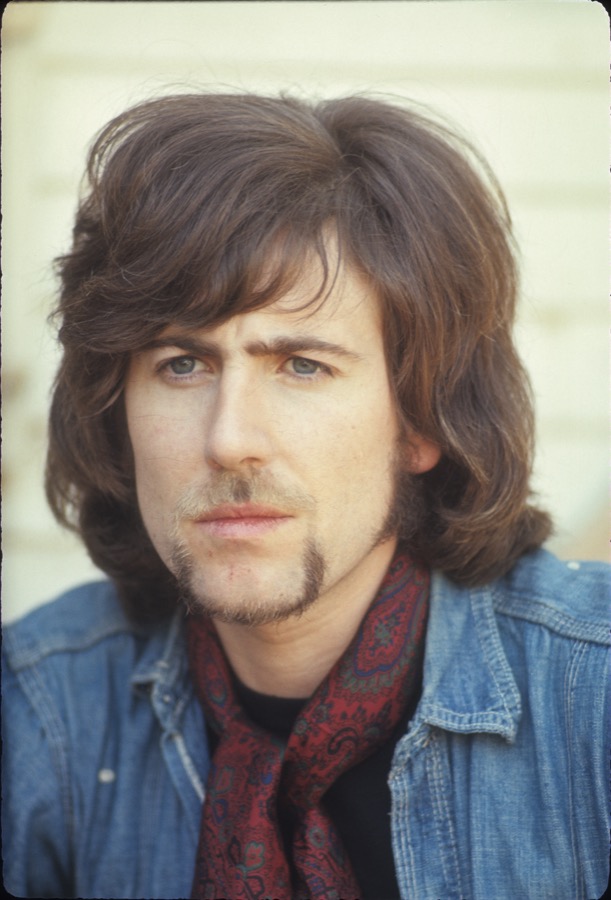
Graham Nash. Photo © Henry Diltz, Courtesy of Gary Strobl at the Diltz Archives. (Used with permission)
Graham Nash, born on Feb. 2, 1942, is still very active in touring and recording, as well as staying involved in his photography work and humanitarian endeavors. He has a U.S. tour on his 2026 calendar. [On January 30, 2025, he reunited with Stephen Stills on stage for the first time in years for the FireAid benefit concert.]
Although he is usually associated with his birthplace of England and his longtime home of Southern California, today Nash lives in New York City with his artist wife Amy Grantham. He remains honest and outspoken, and will always tell you exactly what he is thinking. In this author’s 2008 book Canyon of Dreams: The Magic and the Music of Laurel Canyon, Nash and I discussed the formation of Crosby, Stills and Nash—and later Young—and the years of 1969-70.
These interviews are from 2008 and 2014.
Best Classic Bands: How was 1969 for you? Where were you living and whom were you hanging out with then?
Graham Nash: I think that my time with the Hollies was done, and I knew that instinctively. That was a little tense. I left them on December 8, 1968. On December 10th, I was in Los Angeles with David [Crosby] and Stephen [Stills]. I ended up at Cass Elliot’s house. Cass’ house was kind of a central point for a huge amount of very bright and very colorful people. Basically, I was hanging out with David and Stephen, and Cass. I didn’t know many people. I knew Henry Diltz, since he took photos of the Hollies in 1966. In terms of friends, I only really had David, Stephen and Cass. And [music executive] Elliot [Roberts], probably.
Watch CSN perform “Marrakesh Express” and the Beatles’ “Blackbird” at Woodstock
How did it feel being the only Brit in a group with two Americans?
I felt pretty good about it, because I have a decent sense of humor and I have a decent understanding of how the universe works. And I was faced by these two, and they really were Americans. Crosby was so f**king American. American attitudes. American ego. And Stephen was the same. I must say, I was completely bowled over. I admire Stephen and love him dearly, but Crosby is a different animal on this planet. And I recognized it from the very first moment I ever met him, which of course was through Cass. I was with two real Yanks. Absolutely. I was with two Americans of doom.
Related: In another interview, Nash talks about life after CSN
I felt fantastic. I know that because of the British Invasion and what British music was doing to the American scene, and how admired British groups were by American groups. I felt pretty confident in myself. I happen to believe, and this is not ego talking, I’m pretty good at what I do. You gotta understand: David, Stephen and I came from harmony bands. We were harmony freaks. So, although, as I’ve said before, CS&N never had any claim on any of the notes that we sang. It’s just when that sound happened it was instantly recognized by me, David and Stephen as something stunning.
The repertoire wasn’t developed at gigs.
There were no formal rehearsals before we went into the studio. Our rehearsals consisted of privately going through the tune, and then saying, “Let’s go to [Peter] Fonda’s house! Let’s go to Paul Rothchild’s house! Let’s go to Alan Pariser’s house! Let’s go and sing them this sh*t!” Eventually we could sing that entire album on a couple of acoustic guitars and blow people’s minds.
When I first went into Wally Heider’s studio on Cahuenga in Hollywood to record with [engineer] Bill Halverson, I thought it was small and it was funky. We got in Crosby’s Volkswagen van and drove up to the studio and brought our guitars and amps out and started to make the record.
We knew that we had fabulous songs. I would never play anybody a song if I didn’t feel two things: One, that it got past me. And two, that it would be interesting for you to hear. I have those two criteria whenever I’m writing. First of all, it has to get past me. I have to figure out whether the song has to resonate, has a reason for existing, and after that, do I want to put this on to somebody else? And if the answer to those two questions is yes then you’ll get to hear the song.
Is Cass on your debut LP?
Cass sings on “Pre-Road Downs.” We found a spot for her to join us on a vocal. This album kind of made itself. We had the songs. We had the energy. We were happy as f**k, all of us. Stephen was going out with Judy [Collins]. I was with Joni [Mitchell] and David was with Christine [Hinton]. How better could life be? And Crosby had a lot to do with the best herb.
Not to be ignored is the instrumental playing, particularly things Stills implemented like backward guitar solos.
Stephen Stills was an incredibly impressive musician at that point. He played everything. He was an amazing musician, and generous. And one of the things that we loved was that there were no rules. There have never been any rules. And there will never be any rules in CS&N. It doesn’t matter who sings. Maybe we switch in the chorus: “You sing the high part and I’ll sing the low part.”
There were never any rules. And so, when Stephen did on “49 Bye-Byes” and put his guitar backwards, I sat there and I watched him and went, “How the f**k does he remember the chords backwards?” That when you then flip the tape back to play the real way that his guitar not only would be backwards with this incredible sound, but would change with every chord change. It was an amazing thing to see Stephen do that. To see Stephen do the guitars on “Marrakesh Express.” I’d never seen anybody do anything like that.
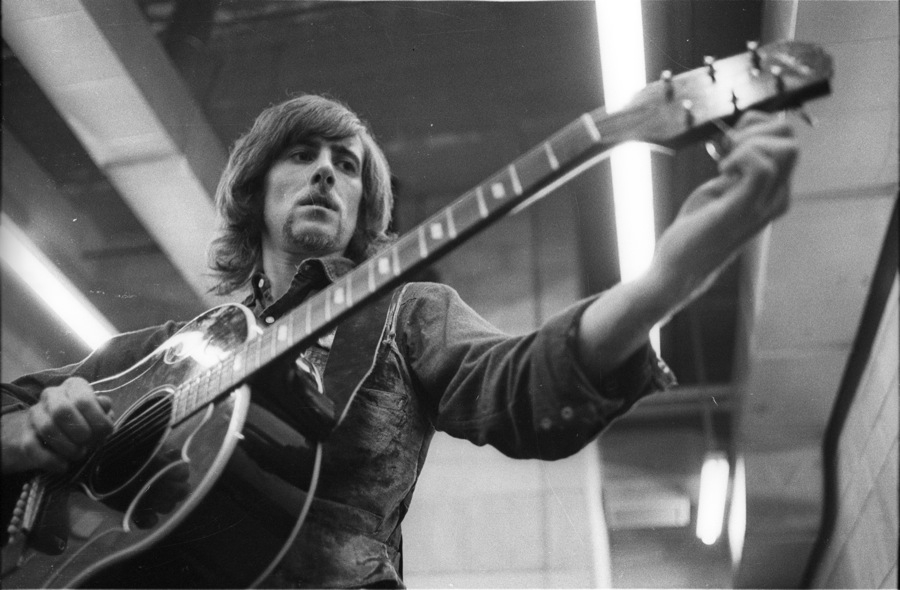
Graham Nash. Photo © Henry Diltz, Courtesy of Gary Strobl at the Diltz Archives. (Used with permission)
You wrote “Marrakesh Express” for the Hollies in 1966. And another one of your compositions, “King Midas in Reverse,” was penned initially for the Hollies. You later played an acoustic rendition of it on the 1970 Crosby, Stills, Nash & Young tour.
I knew “King Midas” was a good choice. It works. It’s now heard from a 1970 Fillmore East show in the 1992 re-release of CSN&Y’s 4 Way Street. The truth is, a song has got to live if I am sittin’ you down in the kitchen and playing it to you on one acoustic guitar. It has to live.
You were a free soul in Laurel Canyon.
I was completely free, and it was an amazing to me. Very often I’ve said I’m one of the luckiest men in the world. I know a lot of people think that way about their life, but it’s really true to me. I’m really an incredibly lucky man. I must have done something right somewhere. I don’t know what the f**k it is, but I must have done something. It’s an incredible story, isn’t it? Like, living in Laurel Canyon.
There’s no way to describe it. My life was unbelievable on every level. Not only as a musician, but as a lover, as a friend, as a songwriter. My life was unbelievable at that point. I would be recording “Suite: Judy Blue Eyes” with David and Stephen and then bring the tapes home and play them for [Joni] and have her absolutely get it.
Watch Crosby, Stills and Nash, joined by Joni Mitchell, singing “Get Together” in 1969
Tell me about your first encounter with Neil Young.
When we finished the [debut] album, we realized that we would have to go out and play live. We knew it was going to be a hit when we walked out of the studio and gave the two-track to [Atlantic Records exec] Ahmet Ertegun. I have a photograph of David and Stephen outside the studio with Ahmet at that very moment. We knew it was going to be a smash. We just knew. Ahmet got it immediately. He listened to that music and said, “Ah, f**k…I want.” So, they worked it out between [David] Geffen and Ahmet. I was on Epic, Columbia wanted Poco, and there was a trade and we all ended up with Ahmet, for which we were incredibly glad. But we realized we would have to go out and play live. OK.
Watch CSN&Y perform “Long Time Gone” with Tom Jones, on the latter’s TV program
So, we’re talking about this and, Stephen says, “Man, I really need to spark off somebody. You and David are pretty good rhythm guitar players but man, I wish we had another…Somebody, maybe an organ player that I can jam with and solo.” We talked with Steve Winwood. We talked with Van Dyke Parks. We needed somebody just to keep Stephen on his game and competitive and on fire.
I think basically that Stephen and Ahmet came up with the idea of (or maybe it was Ahmet to Stephen) getting Neil on board. I was the only one reluctant to bring Neil into the band. And the reason was that we had spent the last few months making this incredible record and developing this beautiful harmonic sound.
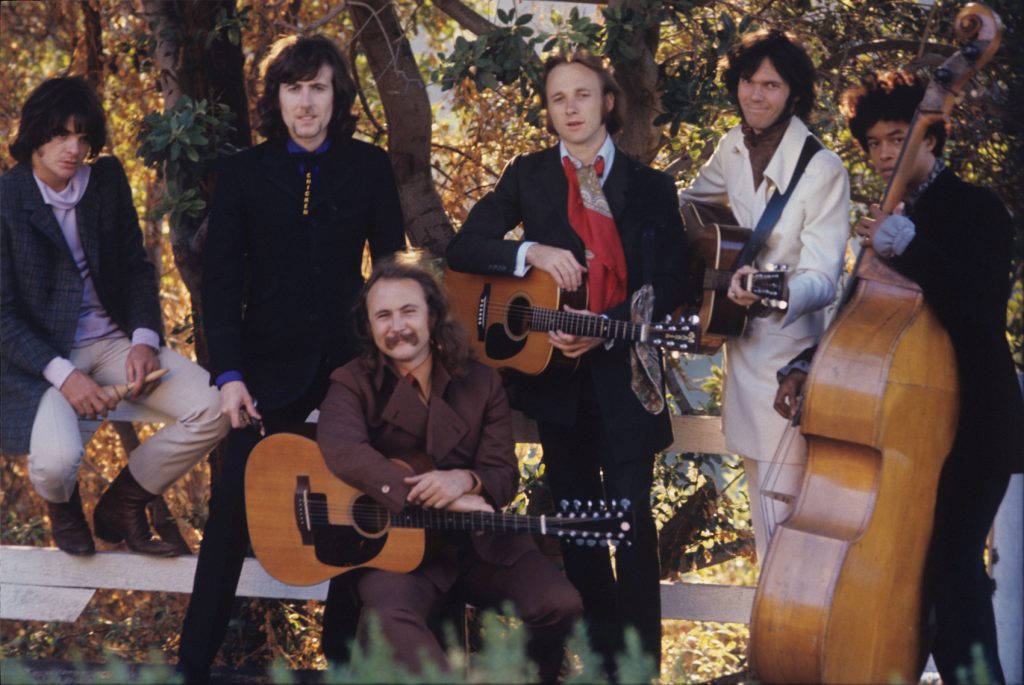
Nash, Crosby, Stills and Young, with drummer Dallas Taylor (L) and bass guitarist Greg Reeves (R) in August 1969 (Photo © Henry Diltz; used with permission)
But Neil wanted to be more than a musician for the road show. I can’t commit to this. I know who Neil is. One of my favorite songs is “Expecting to Fly” from Buffalo Springfield that he did with [arranger/producer] Jack Nitzsche. I knew who Neil was and I loved this f**king song. I was a big fan of the Buffalo Springfield. How could you not? I listened to Buffalo Springfield’s “On the Way Home.” That’s a great one. “For What It’s Worth.”
“But I said, “I can’t commit to this until I meet Neil. I gotta sit down with this cat. I wanna know who he is. I wanna know if I can go on the road with him. I wanna know if I want him to be a part of my life.” And, that made sense to them. So, at a coffee shop on Bleecker Street in New York I went and had breakfast with Neil. After that breakfast I would have made him the President of Canada. He was incredibly funny. He had an incredibly dry sense of humor. He always had a bunch of songs that I loved, “Expecting to Fly” being the primary example. And at the end of that breakfast I walked down to the Village Gate where we were rehearsing and I said, “OK.”
“It was obvious that this man was as serious as a heart attack about his music. It was obvious by hanging out with him that he was destined for great things. And it was obvious by hanging out with him that he could put a fire under Stephen that we needed. Well, have you ever seen me and Stephen play together? We used to start acoustic on the debut tour. We would begin with “Suite: Judy Blue Eyes” and blow their minds. What would happen is that the curtains would open and there would be a line of Martins, and the drums and the bass. And then we’d say, “We’d like to introduce you to our friend, Neil Young.” And the place would go f**kin’ bananas, right? We rehearsed for the first tour on the Warner Bros. set of They Shoot Horses, Don’t They in Burbank.
Watch CSN reprise the debut album’s “Suite: Judy Blue Eyes” live in 2012
It was pretty obvious from the sounds I was listening and the way that Neil was affecting Stephen that this would be a really great thing. And when we got to the Chicago Theater, I think on August 12th,1969, there was a young kid in the audience called Dan Fogelberg, who at that concert decided that he wanted to be a songwriter and a player. And we’re so f**ked up we had Joni open for us! The music got better on stage. Because we were actually doing it, and I didn’t know where it was gonna go after they started playing.
That’s one of the things that has been so fascinating about this band is that there is very little planned. The song is planned, the way we’re gonna do it is up for grabs, and the way it’s gonna get played is up for grabs. But we’ve always been smart enough to realize that in that search, in that scent of discovery of what it is about, what we’re about to do, we don’t bring too much to the equation. We have a song, we know we can play it, we know how it’s going to basically go and the rest is up for grabs. And that’s been one of the great musical things about CS&N and CSN&Y.
It was a different band when Neil joined. Crosby, Stills, Nash and Young are a completely different band than CS&N. And not a lot of people understand that. They think it’s just an added voice. But it’s not. It’s an added attitude. Neil brings a sharper edge. I was gonna say a darker feeling but I don’t mean that in a negative way. He brings this edge to us that we don’t have. And, of course, you have to take into account his ability to play lead guitar against and with Stephen.
Watch CSN&Y perform “Down By the River” live in 1970
Author and music journalist Harvey Kubernik’s books are available here. Various CSN recordings are available here.

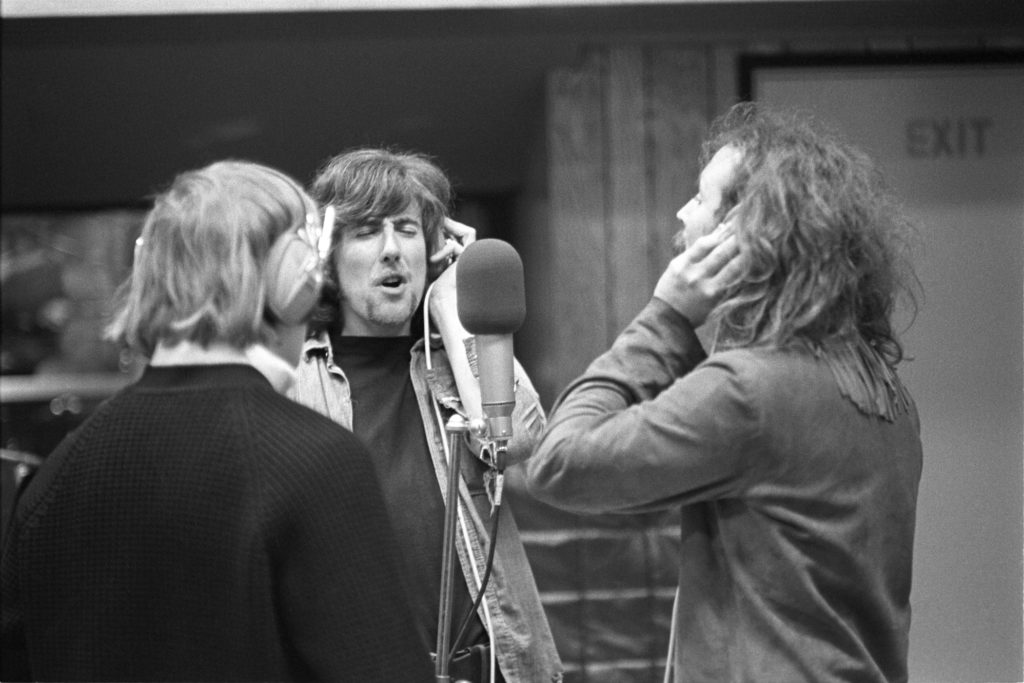
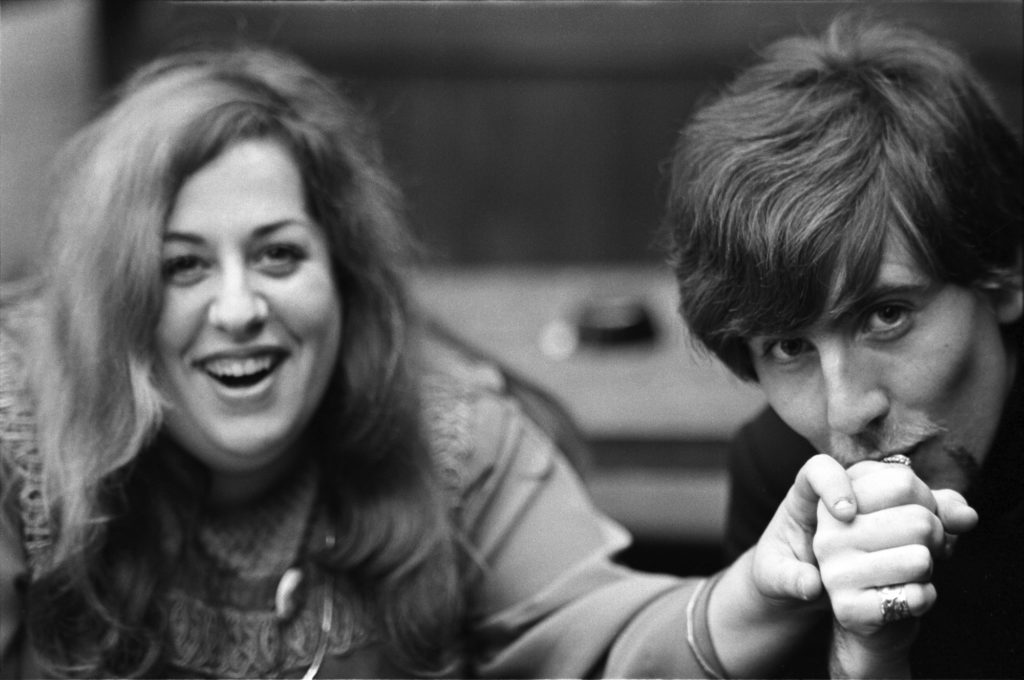
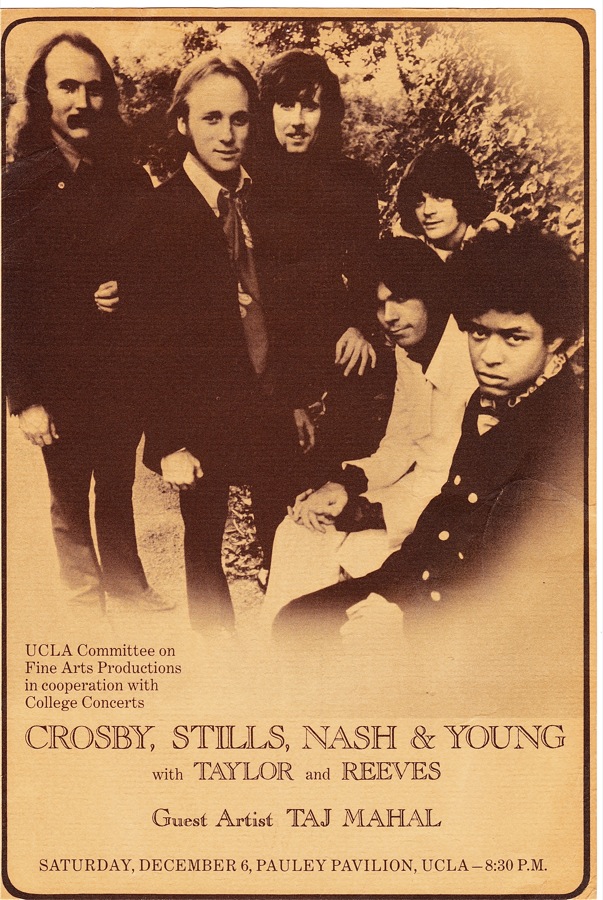
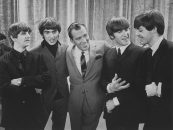
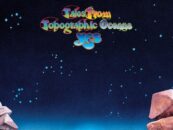
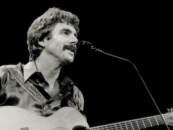
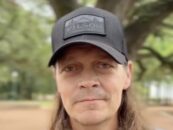

7 Comments so far
Jump into a conversationI never, ever liked CSN&Y. Neil Young is, IMHO (which no one cares about, and I get that), not a good singer at all. CSN were all about the vocal harmonies, but Young was a detriment to that. Neil Young has a whiny, reedy voice that I find spectacularly unattractive and off-putting. When he joined up, things started going downhill and they never really recovered. But the original CSN? Now THERE was a group. Best singers and harmonies this side of the Beach Boys, and Stephen Stills was a monster musician. Boy howdy, those were the days.
There is no dispute concerning personal taste! Rock on!
Agreed. Crosby Stills & Nash were better without the Young, ESPECIALLY with the vocals. And it’s not because that I dislike Young and his music – “Heart of Gold” and “Old Man” are major classics – but his voice is, shall we say a bit generously, an acquired taste.
But it really didn’t matter that much because Young didn’t join CS&N on the harmonies. He only provided another lead guitar and sang lead (mostly solo with some harmony backup) on his own songs.
I have heard these comments before. Everyone’s opinion is valid. I would recommend you visit NYA. And check out the Hearse Theater, truly special stuff.
I grew up with these guys. Buffalo Springfield, the Hollies, the Byrds. It didn’t get better than that.
I attended the August 12, 1969 show at the Chicago theatre. It was incredible. “On The Way Home” was the first number they played with Neil!